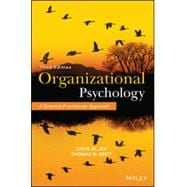
Organizational Psychology A Scientist-Practitioner Approach
- ISBN13: 9781118724071
- ISBN10: 1118724070
- eBook ISBN(s): 9781118724446
- Additional ISBN(s): 9781119888802
- Edition: 3rd
- Format: Hardcover
- Copyright: 2014-12-22
- Publisher: Wiley
- View Upgraded Edition
Note: Supplemental materials are not guaranteed with Rental or Used book purchases.
-
Your order must be $35 or more to qualify for free economy shipping. Bulk sales, PO's, Marketplace items, eBooks and apparel do not qualify for this offer.








